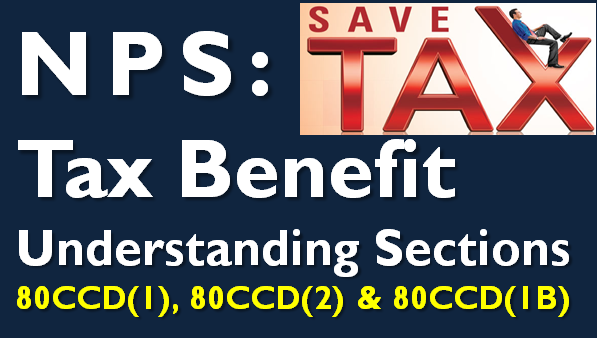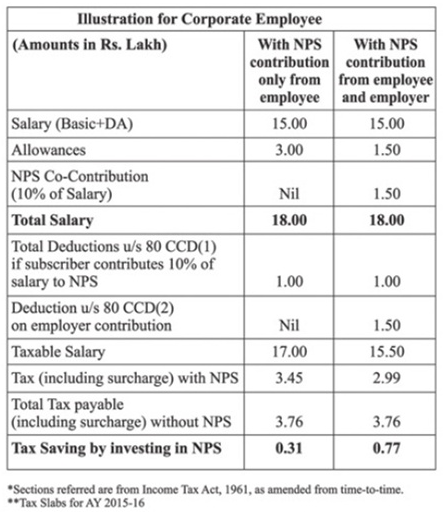In last few weeks I have got several mails and comments asking about the tax benefit on NPS. This post explains the tax deduction availa/ble for NPS under 3 sections: 80CCD(1), 80CCD(2) and 80CCD(1B).
Tax Benefit on NPS Tier 1 and/or 2?
NPS has two Tiers – 1 and 2.
NPS Tier 1 is the long term investment, which has restricted withdrawals and meant primarily for retirement planning. On maturity, you can withdraw maximum of 60% of corpus as lumpsum and rest has to be used for annuity purchase.
NPS Tier 2 is for managing short to medium term investment. You can invest and withdraw anytime as per your wish. This is an optional feature and you are asked if you need Tier 2 account while opening NPS.
All the tax benefit related to NPS is available to investment in NPS Tier 1 account only.
Also Read: When and How can Tax Benefits Claimed Earlier be Reversed?

NPS Tax Benefits:
NPS tax benefits are available through 3 sections – 80CCD(1), 80CCD(2) and 80CCD(1B). We discuss each below:
1. Section 80CCD(1)
Employee contribution up to 10% of basic salary and dearness allowance (DA) up to 1.5 lakh is eligible for tax deduction. [This contribution along with Sec 80C has 1.5 Lakh investment limit for tax deduction]. Self employed can also claim this tax benefit. However the limit is 10% of their annual income up to maximum of Rs 1.5 Lakhs.
2. Section 80CCD(1B)
Additional exemption up to Rs 50,000 in NPS is eligible for income tax deduction. This was introduced in Budget 2015.
Also Read: Should You invest in NPS to take tax benefit u/s 80CCD(1B)
3. Section 80CCD(2)
Employer’s contribution up to 10% of basic plus DA is eligible for deduction under this section above the Rs 1.5 lakh limit in Sec 80CCD(1). This is also beneficial for employer as it can claim tax benefit for its contribution by showing it as business expense in the profit and loss account. Self employed cannot claim this tax benefit.
Below is the illustration on how introducing NPS can help you save tax under Section 80CCD(2).

Tax Benefit for Compulsory NPS deduction:
The earlier pension structure was replaced by NPS in most central and state government jobs since 2004. So anyone who joined after that has compulsory deduction for NPS. The deduction is 10% of basic salary and dearness allowance (DA) and the employer too contributes the matching amount. The confusion for most employees is how they take tax benefit on their compulsory NPS deduction?
Here is an example:
Amit is a government employee and his employer deducts Rs 62,000 per annum (which is 10% of basic + DA) from salary as employee’s contribution in NPS. It also deposits Rs 62,000 per annum as employer’s contribution in NPS. How and under which section should he claim tax benefit on NPS?
Let’s take the easy part first. Employee’s contribution in NPS would be eligible for tax deduction u/s 80CCD(1).
The employee has a choice as to which section [80CCD(1) or 80CCD(1B)] he wants to show his contribution. Ideally he should show Rs 50,000 investment in NPS u/s 80CCD(1B). The tax deduction on rest Rs 12,000 can be claimed u/s 80CCD(1). The section 80CCD(1) along with Section 80C has investment limit eligible for tax deduction as Rs 1.5 lakhs. So he should make additional investment of Rs 1,38,000 in Section 80C to save maximum tax. In all he can save Rs 2 lakhs tax u/s 80C and 80CCD(1B).
I hope this would have cleared the confusion on how NPS helps you save tax.

I am a govt. Employee .In my Form no 16 , u/s 80 ccd (2) deduction ( employer’s contribution) not shown by the employer . They only mention my 10% contribution u/s 80 ccd(1) .Can the get refund when I file return and fill my 10% contribution as same in u/s 80 ccd (2) coloum.
If you show employer NPS contribution, you will have to add the same in income and exemption. Hence there is NO extra tax benefit.
Sir, please help me.
Sir aap ne jo example may likha hai ” let’s take the easy part first. Employers contribution ” kya ye sahe hai .I think yaha Employee contribution hoga. I m right sir????
Thanks for pointing this – corrected it 🙂
Iam NRE and Iam not tax payer. I have NPS ac. I would like to invest 50000 per year until the age of 60. At the time of maturity of NPS, can I claim TDS if Iam not a tax payer at that time.
Sorry I didn’t get your question completely. But here is my opinion of what I understood.
NPS is still not a very mature product and we see changes every year in terms of withdrawal rules or taxation rules. You cannot be sure what would be taxation at the time when your NPS matures.
As of today you need to pay taxes on 20% of corpus and you can avoid paying that if you buy annuity out of the amount. Let me know if you need some more information.
Sir I have joined in govt job in 2012 but but I got PRAN in March 2016 afterwards my nps regular and management share are start crediting in my nps account, there is arrears of previous years also start deducting.Now the question is how much amount can be deduct under section 80 ccd(2)
nps regular 47838
nps arrear in 154510
Same amount in management share
Do NOT worry about 80CCD(2) as its not reflected in Form 16. All amount contributed by employer (with limit of 10% of basic + DA) in NPS is tax free u/s 80CCD(2).
Hello, I am Balajee, a State Govt.employee since 1991 and my Gross Salary is 6.35 lac and I have already availed Tax benefit for PPF of self contribution of Rs 45000/-. Can I avail tax benefit from NPS.
Hello I m NIRMAL chhimpa govt Employee my total u/s 80c i.e. PPF SSY etc including 10% nps deduction 165000 can I redeemed 15000 deduction u/s 80ccd(1b)
There is NO redemption. I am sorry I cannot understand your question. Please rephrase.
Sir
my nps deduction @ 10% of Basic and DA is 70500 PPF Deposit 60000 SI 18600 Sukanya Samridhi Deposit 16000. Can I take benifit of rs. 15100 u/s 80ccd(1b)
I am not deposited into NPS in excess of 10% of Salary and DA
Yes you can take benefit of Sec 80CCD(1B)
Were i get this forum
Sir I am DDO (Drawing & Disbursing Officer) and responsible for TDS deductions. We have clear distinctive amount of employer contribution as well as employee contribution.
Now, I am allowing Employer Contribution in the 80 CCD (2) which is the exact amount which the Govt contributes.
Also I am allowing Employee Contribution in the 80 CCD (1), the amount which employee contributes.
I am not putting these figures in any Section of my choice, as I think that I am bound to allow deductions in their respective section.
Whether I can allow in CCD (1) (B) as illustrated by you. What I have understood is that Rs.50000/- can be allowed if the employee has deposited the same in Tier II contribution i.e. Optional Contribution. Can I allow in CCD (2) more than the amount which Govt has contributed to the employee, which has been illustrated by you.
Kindly help. I dont want that statutory audit (CAG) would make audit para out of this. Kindly help
sir i m employed in govt service my gross salary 7,50000 per year . can i save my tax under NPS scheme of rs 50,000 under 80ccd(1b).
Yes you can
sir i m a govt employee, my annual gross salary is 561000, and my total savings are 81000, I have NPS which is employee share Rs. 47000 and Rs. 47000 is employer share, sir plz guide me how to i take tax benefit and reduce tax….
sir ji hame bhi kuch gyan de dijiye,,,,,
Hi Amit,
Isn’t it mandatory to invest additional amount to claim benefit Under 80CCD(1B) as per the Circular No 1/2017 dated January 2, 2017 (Last para of 5.5.3 of the Circular)
Please give me the link
I am in job at private sector. I invest NPS Tier 1 per financial year Rs. 6500/-. It means can I benifited Tax extemption Rs. 6500/- each FY? What is the maximum limit to invest NPS Tier I to get Tax extemption? Please reply. From Dibyajyoti Saha, Kolkata, West Bengal.
Yes your understanding is correct. You can invest up to Rs 50,000 in NPS to get tax exemption u/s 80CCD(1B) and up to Rs 1.5 lakh to get benefit u/s 80C. Remember 80C limit of 1.5 lakh comprises of lot of other exemptions too like ELSS, PPF, etc!
I will be opening an NPS account …So how much Max contribution should I put there???
I dont know if my Employer will Oblige my request to contribute to My NPS account…. In such cases what can be done…. (They have an rigid SALARY SOFTWARE which is not easily adapting changes, such as partial payments to different accounts etc…)
There is NO limit to contribution to NPS. However the max tax deduction you get is Rs 1.5 lakhs u/s 80CCC & Rs 50K in 80CCD(1B).
sir we invest 1.5 lac in ppf.kya mai 50,000 nps me invest kar 80ccd ke tahat fayda le sakta hoo ki nahi
Yes you can
GOOD EXPLANATION THANKS . RAJIV SINGH
I require clarity around the NPS investment
Under section 80C I have invested to complete the 1.5lac bracket
Additionally; I have NPS employer contribution under 80CCD (2) to the tune of 42k
Needed to understand if I can invest additionally 50k in the 80CCD (1B) bracket from a tax saving perspective
Yes you can invest additional Rs 50K in NPS to get tax benefit u/s 80CCD(1B)
Thank you Amit for your speedy response. Since I have NPS login where my employers contributions are being monitored, can I use the same credentials to channelize my online contributions under 80CCD (1B) for an amount of 50k
Yes you should be able to do that online.
Hello Amit, in that Case Sandra would be eligible for Tax exemption for 1.5 lakhs ( 80C ) + 50 K ( 80CCD [1B] ) + 42K ( 80CCD [2]) In that understanding correct ??
42K u/s 80CCD(2) is related to employee contribution. If you see form 16 this is not added to your income and hence you cannot claim any extra exemption on that account.
My Gross annual salary is 30lakhs, Pls give detailed list of deductions I can claim under various Income tax benifits schemes…
I will be opening an NPS account …So how much Max contribution should I put there???
I dont know if my Employer will Oblige my request to contribute to My NPS account…. In such cases what can be done…. (They have an rigid SALARY SOFTWARE which is not easily adapting changes, such as partial payments to different accounts etc…)
You might want to download Tax Planning Guide for FY 2016-17 for complete tax saving sections. Just check if you have missed any!
Employer not shown 80CCD(2) NPS Contribution amount in form 16
they shown only employee amount in 80CCD(1B)
Shall I claim Employer Contribution also when I filling return………..
No You cannot. If you claim exemption you would also need to add the same in your income resulting in NO extra tax saving!